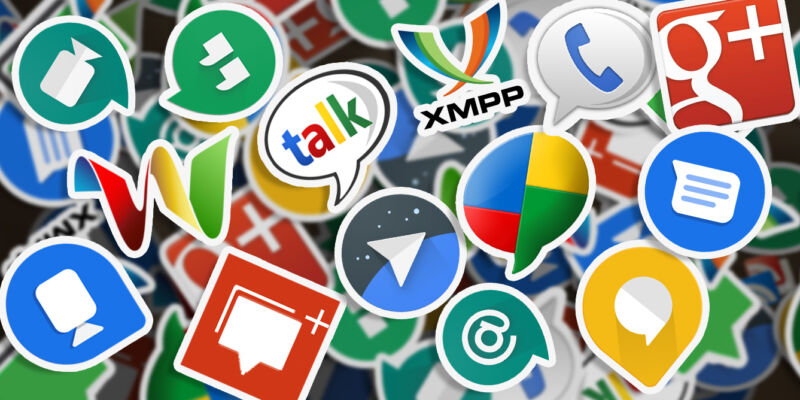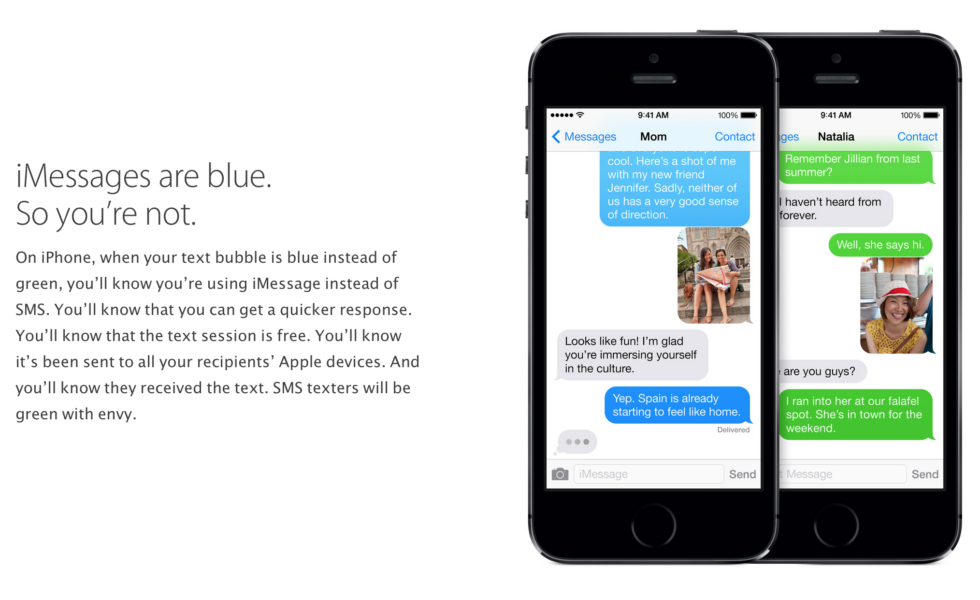
Google took to Twitter this weekend to complain that iMessage is just too darn influential with today’s kids. The company was responding to a Wall Street Journal report detailing the lock-in and social pressure Apple’s walled garden is creating among US teens. iMessage brands texts from iPhone users with a blue background and gives them additional features, while texts from Android phones are branded green and only have the base SMS feature set. According to the article, “Teens and college students said they dread the ostracism that comes with a green text. The social pressure is palpable, with some reporting being ostracized or singled out after switching away from iPhones.” Google apparently feels this is a problem.
“iMessage should not benefit from bullying,” the official Android Twitter account wrote. “Texting should bring us together, and the solution exists. Let’s fix this as one industry.” Google SVP Hiroshi Lockheimer chimed in too, saying “Apple’s iMessage lock-in is a documented strategy. Using peer pressure and bullying as a way to sell products is disingenuous for a company that has humanity and equity as a core part of its marketing. The standards exist today to fix this.”
The “solution” Google is pushing here is RCS, or Rich Communication Services, a GSMA standard from 2008 that has slowly gained traction as an upgrade to SMS. RCS adds typing indicators, user presence, and better image sharing to carrier messaging. It is a 14-year-old carrier standard though, so it lacks many things you would want from a modern messaging service, like end-to-end encryption and support for nonphone devices. Google tries to band-aid over the aging standard with its “Google Messaging” client, but the result is a lot of clunky solutions which aren’t as good as a modern messaging service.
Since RCS replaces SMS, Google has been on a campaign to get the industry to make the upgrade. After years of protesting, the US carriers are all onboard, and there is some uptake among the international carriers, too. The biggest holdout is Apple, which only supports SMS though iMessage.

Apple hasn’t ever publicly shot down the idea of adding RCS to iMessage, but thanks to documents revealed in the Epic v. Apple case, we know the company views iMessage lock-in as a valuable weapon. Bringing RCS to iMessage and making communication easier with Android users would only help to weaken Apple’s walled garden, and the company has said it doesn’t want that.
In the US, iPhones are more popular with young adults than ever. As the Wall Street Journal notes, “Among U.S. consumers, 40% use iPhones, but among those aged 18 to 24, more than 70% are iPhone users.” It credits Apple’s lock-in with apps like iMessage for this success.
Reaping what you sow
Google clearly views iMessage’s popularity as a problem, and the company is hoping this public-shaming campaign will get Apple to change its mind on RCS. Having Google give other companies advice on a messaging strategy is a laughable idea though, since Google probably has the least credibility of any tech company when it comes to messaging services. If the company really wants to do something about iMessage, it should try competing with it.
As we recently detailed in a 25,000-word article, Google’s messaging history is one of constant product startups and shutdowns. Thanks to a lack of product focus or any kind of top-down mandate from Google’s CEO, no division is really “in charge” of messaging. As a consequence, the company has released 13 halfhearted messaging products since iMessage launched in 2011. If Google has anyone to blame for the iMessage’s dominance, it should start with itself, since it has continually sabotaged and abandoned its own plans to make an iMessage competitor.
Messaging is important, and even if it isn’t directly monetizable, a dominant messaging app has real, tangible benefits for an ecosystem. The rest of the industry understood this years ago. Facebook paid $22 billion to buy WhatsApp in 2014 and took the app from 450 million users to 2 billion users. Along with Facebook Messenger, Facebook has two dominant messaging platforms today, especially internationally. Salesforce paid $27 billion for Slack in 2020, and Tencent’s WeChat, a Chinese messaging app, is pulling in 1.2 billion users and yearly revenues of $5.5 billion. Snapchat is up to a $67 billion market cap, and Telegram is getting $40 billion valuations from investors. Google keeps trying ideas in this market, but it never makes an investment that is anywhere close to the competition. https://arstechnica.com/?p=1824725

